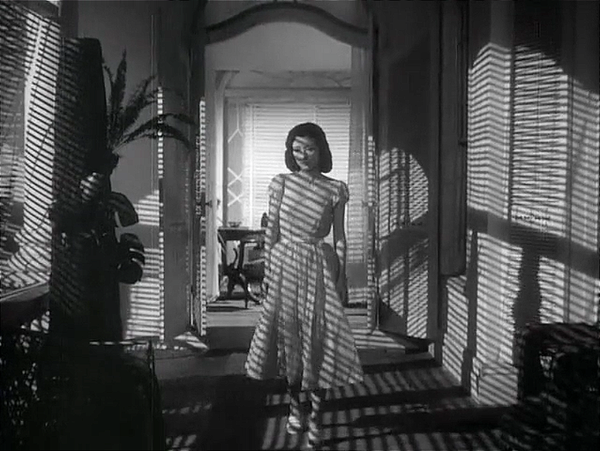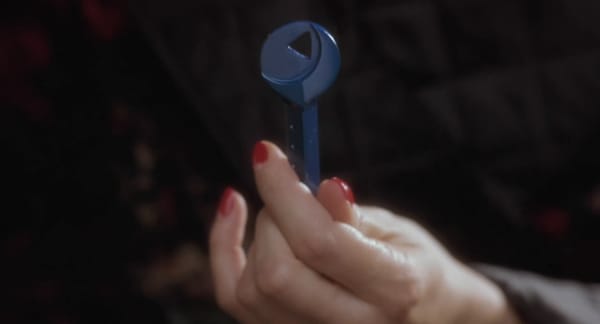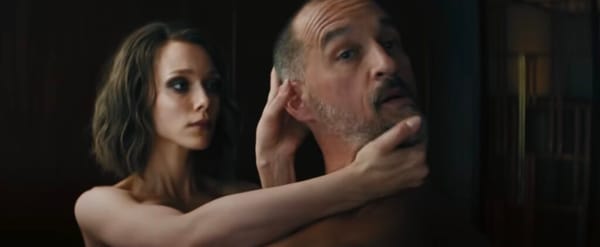What to Watch: "The Phantom of the Open"
Plus: Trolling the Netflix bin for movie gold.

The Nut Graf: “The Phantom of the Open” (in theaters and on premium VOD, **1/2 out of ****) stars Mark Rylance as a British duffer who crashed the upper-crust gates of golf in the 1970s. Great good fun, but in the end, it’s par for the course. Plus: Five good movie bets on Netflix (and one so bad it’s good).
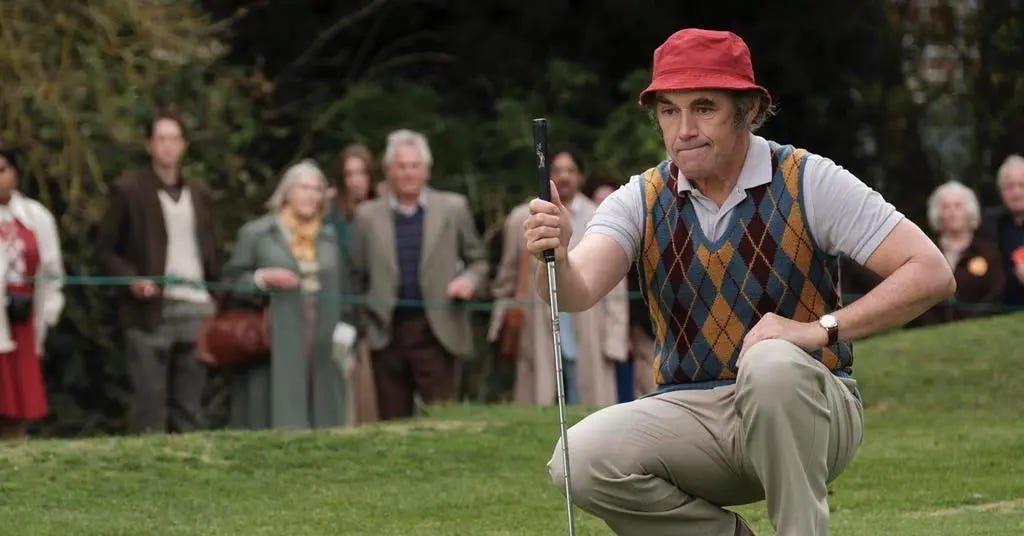
I’m one of those curious people who likes golf movies but can’t stand golf. I don’t begrudge friends and family members who play the game, including the ones who treat it as a secular religion. I just don’t want to hear about it – your handicap, the eagle you hit last week, whatever – and while we’re at it, start taxing the golf courses or let them return to the wild.
But a good golf movie can dramatize the game while letting the air of self-satisfaction out of its tires. I’m thinking of the 1996 Kevin Costner comedy “Tin Cup” and the fine, little-known “The Greatest Game Ever Played” (2005), in which Shia LeBoeuf plays Francis Ouimet, the real-life working-class amateur who took on the toffs at the 1913 U.S. Open in Brookline, MA. Golf comedies, too, from W.C. Fields in “The Golf Specialist” (1930) to Jerry Lewis in “The Caddy” (1953) to Adam Sandler in “Happy Gilmore” (1996), with a special callout to that incredible putt Kate Hepburn sinks in “Bringing Up Baby” (1937). The glutinous nadir of the genre is probably “The Legend of Bagger Vance” (2000), with its Magical Negro caddy (Will Smith), just as the movie that best celebrates the game while giving it no respect whatsoever is the deathless 1980 “Caddyshack.”
“The Phantom of the Open” looks like a golf movie, but it really belongs to another genre: The Lovable British Misfit comedy, in which a plucky nobody with a dream and a bee in the bonnet becomes famous for letting their freak flag fly, alarming the authorities while winning the hearts of his or her countrymen. “Brassed Off,” “Billy Elliott,” “Calendar Girls,” “Kinky Boots,” the recent “The Duke” – they mint these things like souvenir coins over there. “Phantom” is based on the true story of Maurice Flitcroft – you couldn’t make that name up – a shipyard crane operator in the north of England who decided to enter the 1976 British Open despite never having played golf in his life. I found myself laughing out loud just reading the Wikipedia entry on Flitcroft: He posted the worst score in the Open’s history (121; the norm was in the low 70s), was subsequently banned from the circuit, and kept entering tournaments under false names like Gene Paycheki and Arnold Palmtree.
The movie mixes the humor with a healthy serving of sentiment, and it has the peerless Mark Rylance in the lead as Maurice, which turns out to be a mixed blessing. No one disappears into the pores of British character parts like Rylance – see the recent “The Outfit” for confirmation – and while he’s more of a chameleon than Bill Nighy, who tends to stick to the upper-middle-class end of the spectrum while Rylance tills the lower ranks, I think of them as essentially similar in their humble but intensely British self-absorption. (I have a dream of the two actors co-starring in an endless and endlessly funny production of “Waiting for Godot.”)
Rylance’s Maurice is mesmerizing to watch, a creation of swallowed consonants and unshakable certainty – a duffer who believes he has as much right as any rich man to address the ball, no matter that he’s a simply terrible golfer. That self-belief, cheerful and delusional, scandalizes the sport’s elite but makes him a folk hero and beloved found object to the British tabloids and his fellow commoners at home and in America. Everyone loves a little guy who won’t take no for an answer, right?
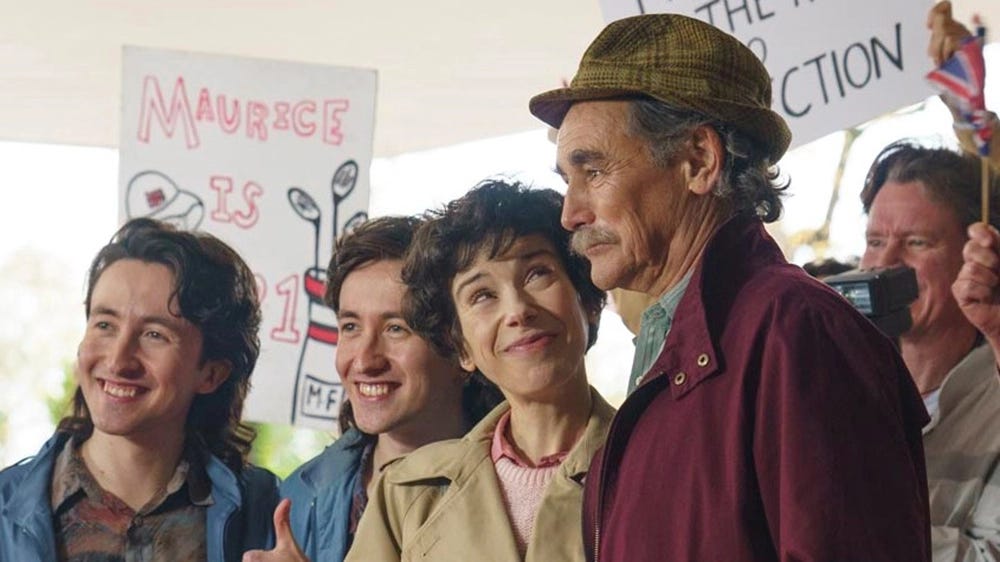
Right, which is why almost every review you’ll read of “The Phantom of the Open” trots out the phrase “crowd-pleaser” as both a recommendation (your enjoyment is guaranteed) and a warning. As is standard practice, we see the real Maurice Flitcroft under the end credits, and – like the heroes of “Jerry and Marge Go Large,” another current crowd-pleaser – you may sense a less cozy but more thoughtful version of the tale that could have been told but wasn’t. Instead, director Craig Roberts piles on the era’s kitschy hits – Maurice’s twin sons, played by Christian and Jonah Lees, are competitive disco dancers – lets his star err on the side of cute, and wastes the great Sally Hawkins in the necessary but thankless role of the hero’s ever-supportive wife. (Hawkins’ entry in the Lovable Misfit genre is “Maudie,” from 2016, and it is an altogether tougher and better piece of work.) Did Maurice’s grateful speech to his wife in the final scenes yank my tear ducts? You bet it did. Can I recommend “The Phantom of the Open” regardless of whether you approach the ball as a convert or run fast in the other direction? Sure. But sometimes comfort’s gain is truth’s loss. And sometimes a tight lie is still a lie.
Five Netflix Picks for the Weekend: As mentioned up top, “The Phantom of the Open” is fresh off its theatrical release and streaming at “premiere VOD” prices of $19.99 – still cheaper than the cost of two movie tickets, but feel free to wait a month or two for it to be available at lower prices. Or maybe you want to save your simoleons and just watch something on Netflix. As regular readers of the Watch List know, I periodically troll the service’s movie selections – all 3,800 of them, catalogued here – and try to find the diamonds, or the better chunks of zirconium, among the offerings. It’s surprisingly difficult, because Netflix is still more interested in A) creating original series and stand-alone movies, although who know how long that will last given their last quarterly report, B) getting you hooked on series from other countries and other services, and C) catering quite successfully to non-English language constituencies with commercial hits and genre films in Hindi, Cantonese, Turkish, etc. There’s little to no curation for Hollywood movies, independent American releases, or foreign-language art house fare, no conscious film acquisition or programming – what’s there is just what’s there, and you have to dig for it willy-nilly. Or let me do it for you. Here are five current semi-precious gems gleaming amidst the dross.
“The B-Side: Elsa Dorfman’s Portrait Photography” (2017) – The late Dorfman was a Boston-area artist whose large-format Polaroid family portraits became much-loved status symbols. Directed fondly by Errol Morris, it’s a thought-provoking visit with a deceptively self-effacing artist.
“The Battered Bastards of Baseball” (2014) – Irresistible documentary about larger-than-life Hollywood character actor Bing Russell (Kurt’s dad), who bought a failing minor-league ball franchise in 1972 and turned it into the scrappy, independent Portland Mavericks. Great fun.
“Everybody Knows” – A tangled, sun-dappled Spanish melodrama about old loves, buried resentments, and fresh crimes, with stars Penelope Cruz and Javier Bardem at their most earthily glamorous. Not the most deathless film from Asghar Farhadi (“A Separation”), but as I wrote in my Globe review, “Sometimes we just want to go to movies to watch pretty people screw up their lives.”
“The Railway Man” (2014) – An odd duck but a compelling one: What starts as a late-life romance starring Colin Firth and Nicole Kidman takes a left turn into WWII-era PTSD drama and a touching reconciliation of one-time enemies. Firth sells it.
“Results” (20125) – Andrew Bujalski (“Support the Girls”) makes quirky, low-fi comedies of disconnection; this one has Guy Pearce (“L.A. Confidential”) and a gloriously aggressive Colbie Smulders (“How I Met Your Mother”) as a small town gym owner and his star trainer, once and future lovers if they can ever get out of their own way.
And one ringer: “10,000 B.C.” (2008) – A patently silly land-before-time drama that you may enjoy on its own merits or as a hate-watch and which I treasure for providing the opportunity in 2008 to write an entire movie review in fake-Biblical doubletalk. You get your jollies where you can.
If you enjoyed this edition of Ty Burr’s Watch List, please feel free to share it with friends.
If you’re not a paying subscriber and would like to sign up for additional postings and to join the discussions, here’s how:
If you’re already a paying subscriber, I thank you for your generous support.


